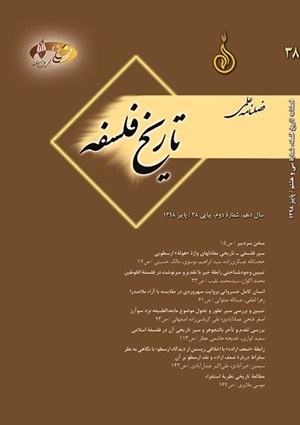تبيين وجودشناختي رابطه خير با تقدير و سرنوشت در فلسفه افلوطين
محورهای موضوعی : Geneology of philosophical schools and Ideasسيد محمد نقيب 1 , محمد اكوان 2
1 - دانشگاه ازاد اسلامي واحد تهران مركز
2 - دانشيار گروه فلسفه غرب دانشگاه ازاد اسلامي واحد تهران مركز
کلید واژه: خير عقل ايدهها تقدير سرنوشت افلوطين ,
چکیده مقاله :
«خير» در فلسفۀ افلوطين نخستين اقنوم از اقنومهاي سه گانه است و از دو جهت خير است: يكي در قوس نزول بعنوان علت فاعلي و ديگري در قوس صعود بعنوان علت غايي همه موجودات. عقل، نخستين جلوۀ خير است که در عين حال هم تعقل است و هم وجود، هم جنبۀ هستيشناختي دارد و هم جنبۀ معرفت شناختي. عقل بر جهان هستي و همۀ مراتب آن نظارت دارد؛ يعني جهان، طبق مقدّرات و اندازهگيري و طرح و برنامه يي که عقل براي ادارۀ آن تنظيم و ترسيم کرده است، تدبير ميشود. سرنوشت انسان نيز از اين قاعده مستثني نيست اما انسان چون طبق مقدّرات عقل، از اختيار برخوردار است در نظام خلقت فقط موجودي انفعال پذير نيست بلکه با اختيار خود ميتواند ضمن ارتباط و اتحاد با خير، به سعادت ابدي نايل گردد. بنابرين، از نظر افلوطين همۀ جهان هستي از خير بعنوان فاعل و غايت آفرينش بهرهمند است. مسئله اصلي ما چگونگي ربط خير با تقدير و هدف نوشتار حاضر تبيين اين امر و نتيجه روشنگر اين است كه خير از مجراي عقل به تدبير عوالم معقول و محسوس ميپردازد.
The Good is the first of the three hypostases in Plotinian philosophy and is considered to be the Good in two ways: in the arc of descent as the efficient cause and in the arc of ascent as the final cause of all beings. The Intellect is the first manifestation of the Good and is, at the same time, the same as both intellection and existence. It enjoys both an ontological and an epistemological aspect. The Intellect supervises the world of being and all its levels; in other words, the world is administered according to the decrees, measures, plans, and programs that the Intellect has devised and determined for it. Man’s fate is no exception to this rule; however, since, based on the Intellect’s pre-destined rules, they enjoy free will, they are not simply passive beings in the order of creation. Rather, relying on their free will and while uniting with the Good, they can achieve eternal happiness. Therefore, in Plotinus’ view, the whole world of being is blessed with the Good as the agent and end of creation. This paper examines the relationship between the Good and destiny and concludes that the Good administers the intelligible and sensible worlds through the Intellect.
